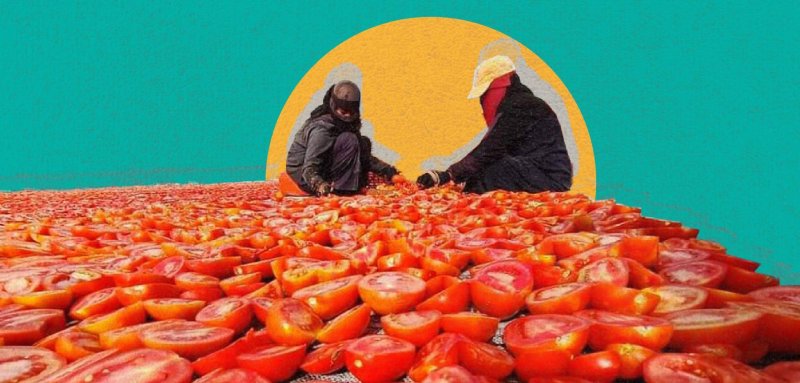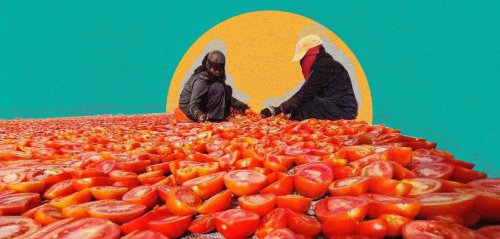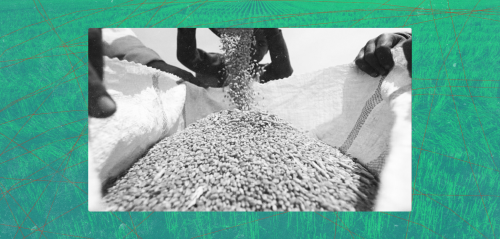As each year passes, the effects of climate change can be seen more clearly, and this is no exception to the region of Upper Egypt. But some farmers in the Nile Valley region believe that the high temperatures caused by climate change could be turned into an opportunity and a blessing for a number of agricultural crops if they can come up with innovative solutions and novel ideas.
The governorates of Upper Egypt have witnessed noticeable changes in temperatures during the last five years, as each year the temperature rises more than the previous one. This is negatively affecting many sectors in the country, especially the agricultural sector, as it decreases the productivity of many crops, as well as the quality of other crops, and thus their ability to be stored, handled, and traded.
But recently, the people of Upper Egypt have come up with methods to "exploit" these high temperatures that their areas are so known for, like drying their tomato harvest. This has brought them great agricultural, economic, and social benefits, as it protects them from the accumulation of debts resulting from the spoilage of large quantities of tomatoes, creates new job opportunities for different groups and categories, including youth and women, and allows the population to invest the available capabilities to create additional economic returns for them.
Some farmers in Upper Egypt believe that rising temperatures caused by climate change could be turned into an opportunity and a blessing
Economic returns
It is no longer a strange sight for those who regularly visit the governorates of Luxor or Aswan nowadays, especially during the winter months, to see vast areas covered by red tomatoes. There, this rich fruit that some now call "red gold", is cut, salted, and laid out in an organized and neat manner, either on areas designated for them on the ground, or on wooden and iron sawmills designed specifically for the drying process.
Wahid Attia, a farmer in the Esna district in Luxor governorate, said that over the past two years, more and more companies have offered to contract Upper Egypt farmers to grow and supply tomatoes for drying. He explains, "The recent spread of the practice of tomato drying has helped us maintain the stability of their prices for us as farmers, while at the same time achieve a good financial return from growing them".
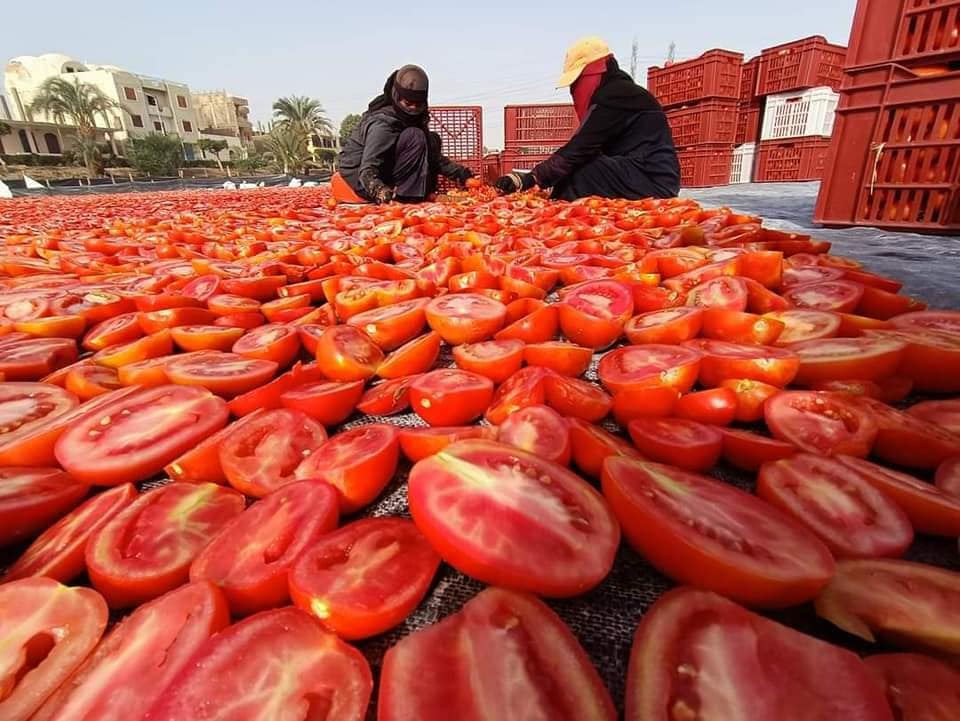
He pointed out that the production of one acre is estimated at thirty-five tons of tomatoes, and the cost of producing an acre reaches 25 thousand Egyptian pounds (about one thousand US dollars), meaning that the cost of growing a ton of tomatoes is about 700 Egyptian pounds, and companies that require dried tomatoes pay farms between 10,000 and 12,000 Egyptian pounds per ton. The companies also take care of transporting the tomatoes to their assigned drying locations, and therefore the economic returns from this work are rewarding.
In the same context, tomato drying projects in the governorates of Upper Egypt are a destination for thousands of young men and women looking for a job opportunity.
Mohyie Youssef, a young man from Luxor, tells Raseef22 that he works on tomato drying projects with five of his friends, noting that the financial return is great compared to other job opportunities within the governorate.
It is no longer a strange sight for those who regularly visit Luxor or Aswan, especially during the winter months, to see vast areas covered by red tomatoes. There, this rich fruit dubbed "red gold", is cut, salted, and laid out neatly for the drying process
Youssef works from eight in the morning until four in the evening, and his daily wages range between 300 and 350 Egyptian pounds (12-14 dollars), which is more than the financial return he may get from working in agriculture. The daily wages of someone who works in growing crops like potatoes, tomatoes and sugar cane does not exceed 200 pounds. It is also a non-permanent job, and is only needed during the planting and harvest seasons. He also pointed out that work in factories in the region has been greatly affected in recent years, especially after the spread of the coronavirus pandemic. Almost half of the workers were laid off, and the monthly salary in them does not exceed 2,000 Egyptian pounds, so working on tomato drying projects remains more rewarding.
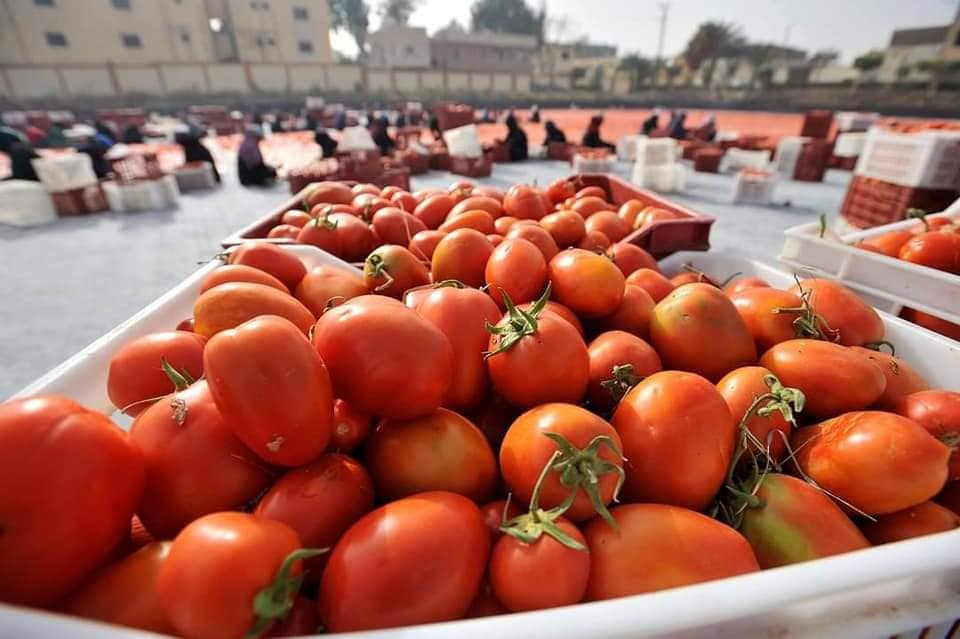
"A glimmer of hope"
Dr. El-Sayed El-Naka, a professor at the Faculty of Agriculture at Zagazig University, tells Raseef22 that the tomato drying process, which has become widespread in Upper Egypt, especially in the governorates of Luxor and Aswan, has many benefits.
He explains, "In light of the low prices of the tomato crop during the harvest season, and it being sold at prices that are not proportionate with the costs spent on it in the stages of its cultivation, this has severely affected tomato farmers over the past two years, so many of them thought of refraining from growing tomatoes altogether, given the large losses they suffered and the debts they accumulated as a result."
According to him, production costs include purchasing seedlings, pesticides, and fertilizers, along with the land rent, the costs of collecting and transporting the crop, as well as the fuel and energy needed to operate the irrigation machines. He says, "At the end of the day, the farmer is left with a small amount of money, and ends up indebted to pay the price of the fertilizer and the rent of the land."
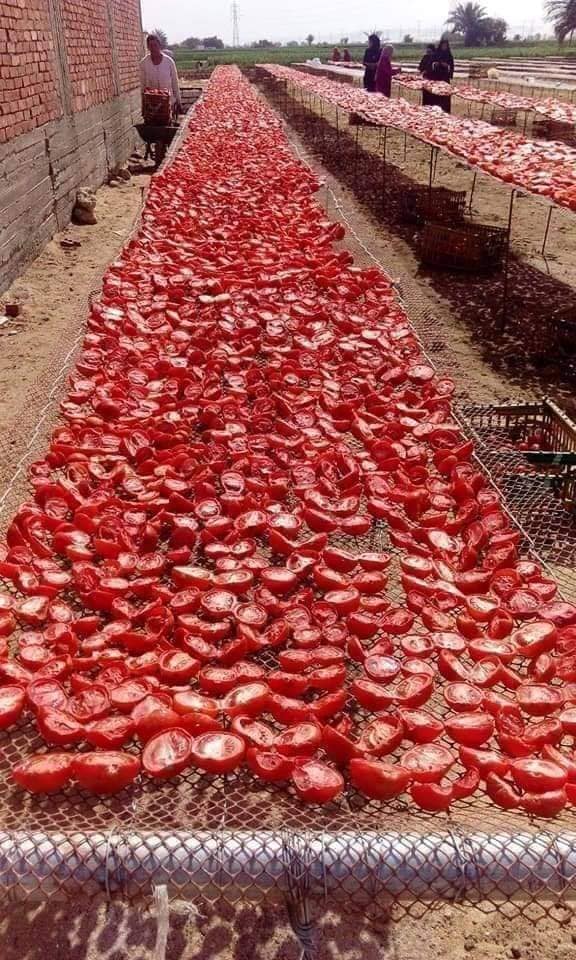
He further notes that more than a quarter of the crop is spoiled during its transportation, due to the extreme heat and the remoteness of the governorates of Upper Egypt from the main consuming markets. He adds, "The governorates of Upper Egypt resorting to drying tomatoes has greatly reduced the crop damage and the farmers’ losses. The tomato fruit contains a large percentage of water, and when exposed to extreme temperatures that exceed forty degrees Celsius, while being transported stacked in cages to the nearest factory that is more than two hours away from the planting locations, it becomes easily spoiled."
He pointed out that the idea of drying contributes to activating the idea of contract farming between the farmer and the marketers, thus achieving balance and stability in tomato prices. According to the spokesman, during the 2022-2023 season, export companies contracted to export 12,000 tons of dried tomatoes, which is a large percentage of local production.
Luxor is the main station of production for dried tomato exports from Egypt, with about 80% of these exports coming from this area, while the rest comes from the governorates of Aswan, Qena, and Faiyum. They are mainly taken towards European countries such as Italy, Germany and Spain, as well as the UAE, and Brazil, among other countries.
The governorates of Upper Egypt resorting to drying tomatoes has greatly reduced crop damage and farmers’ losses. Tomatoes contain a lot of water, and when exposed to extreme temperatures while being stacked in cages, they can be easily spoiled
The utmost care
Agricultural engineer Anas al-Shammari tells Raseef22 that the tomato drying process faces several problems that must be carefully dealt with to ensure a better quality of the process as a whole.
One of these problems is the presence of black spots in some pieces of tomatoes, and the reason for this is poor ventilation. It is also possible for mold or an unpleasant odor to appear in dried tomatoes, and the reason for this lies in them not being tuned properly, thus causing them to retain moisture. The most prominent problems facing the drying process, according to him, are the appearance of worms, which happens when damaged tomatoes are used, along with the lack of cleanliness of the surrounding environment and flies landing on them. Therefore the tomato fruits that are intended for drying must be chosen with the utmost care.
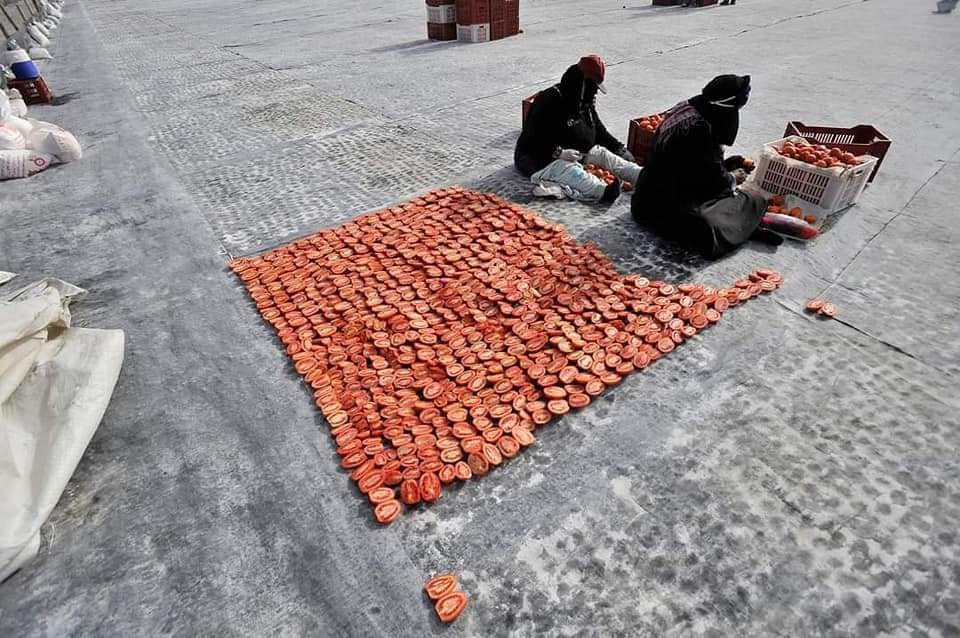
Although China is considered the number one producer of tomatoes in the world, while Egypt ranks fifth, al-Shammari indicates that growing tomatoes in Egypt is regularly done throughout the entire year, while it is only grown once in China. This is a great advantage for Egypt and its tomato drying projects, as it may very well become a very important source of economic return for the country and the population in the coming years.
Raseef22 is a not for profit entity. Our focus is on quality journalism. Every contribution to the NasRaseef membership goes directly towards journalism production. We stand independent, not accepting corporate sponsorships, sponsored content or political funding.
Support our mission to keep Raseef22 available to all readers by clicking here!
Interested in writing with us? Check our pitch process here!
